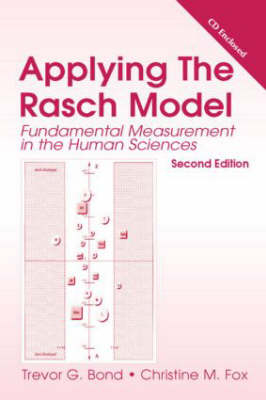
Applying the Rasch Model
Fundamental Measurement in the Human Sciences, Second Edition
Seiten
2007
|
2nd New edition
Routledge Academic (Verlag)
978-0-8058-5461-9 (ISBN)
Routledge Academic (Verlag)
978-0-8058-5461-9 (ISBN)
- Titel erscheint in neuer Auflage
- Artikel merken
Zu diesem Artikel existiert eine Nachauflage
Reviews the crucial properties of the Rasch model and demonstrates its use with a range of examples including the measurement of educational achievement, human development, attitudes, and medical rehabilitation. This book demonstrates how to apply Rasch analysis and prepares readers to perform their own analyses and interpret the results.
Written in an accessible style, this book facilitates a deep understanding of the Rasch model. Authors Bond and Fox review the crucial properties of the Rasch model and demonstrate its use with a wide range of examples including the measurement of educational achievement, human development, attitudes, and medical rehabilitation. A glossary and numerous illustrations further aid the reader's understanding. The authors demonstrate how to apply Rasch analysis and prepare readers to perform their own analyses and interpret the results.
Updated throughout, highlights of the Second Edition include:
a new CD that features an introductory version of the latest Winsteps program and the data files for the book’s examples, preprogrammed to run using Winsteps;
a new chapter on invariance that highlights the parallels between physical and human science measurement;
a new appendix on analyzing data to help those new to Rasch analysis;
more explanation of the key concepts and item characteristic curves;
a new empirical example with data sets demonstrates the many facets of the Rasch model and other new examples; and
an increased focus on issues related to unidimensionality, multidimensionality, and the Rasch factor analysis of residuals.
Applying the Rasch Model is intended for researchers and practitioners in psychology, especially developmental psychologists, education, health care, medical rehabilitation, business, government, and those interested in measuring attitude, ability, and/or performance. The book is an excellent text for use in courses on advanced research methods, measurement, or quantitative analysis. Significant knowledge of statistics is not required.
Written in an accessible style, this book facilitates a deep understanding of the Rasch model. Authors Bond and Fox review the crucial properties of the Rasch model and demonstrate its use with a wide range of examples including the measurement of educational achievement, human development, attitudes, and medical rehabilitation. A glossary and numerous illustrations further aid the reader's understanding. The authors demonstrate how to apply Rasch analysis and prepare readers to perform their own analyses and interpret the results.
Updated throughout, highlights of the Second Edition include:
a new CD that features an introductory version of the latest Winsteps program and the data files for the book’s examples, preprogrammed to run using Winsteps;
a new chapter on invariance that highlights the parallels between physical and human science measurement;
a new appendix on analyzing data to help those new to Rasch analysis;
more explanation of the key concepts and item characteristic curves;
a new empirical example with data sets demonstrates the many facets of the Rasch model and other new examples; and
an increased focus on issues related to unidimensionality, multidimensionality, and the Rasch factor analysis of residuals.
Applying the Rasch Model is intended for researchers and practitioners in psychology, especially developmental psychologists, education, health care, medical rehabilitation, business, government, and those interested in measuring attitude, ability, and/or performance. The book is an excellent text for use in courses on advanced research methods, measurement, or quantitative analysis. Significant knowledge of statistics is not required.
Contents: Preface. Foreword. Why Measurement Is Fundamental. Important Principles of Measurement Made Explicit. Basic Principles of the Rasch Model. Building a Set of Items for Measurement. Invariance: A Crucial Property of Scientific Measurement. Measurement Using Likert Scales. The Partial Credit Rasch Model. Measuring Facets Beyond Ability and Difficulty. Development, Education, Rehabilitation: Change Over Time. The Rasch Model Applied Across the Human Sciences. Rasch Modeling Applied: Rating Scale Design. Model Fit and Unidimensionality. A Synthetic Overview. Appendices.
| Erscheint lt. Verlag | 5.7.2007 |
|---|---|
| Verlagsort | New York |
| Sprache | englisch |
| Maße | 152 x 229 mm |
| Gewicht | 656 g |
| Themenwelt | Geisteswissenschaften ► Psychologie |
| Sozialwissenschaften ► Soziologie ► Empirische Sozialforschung | |
| ISBN-10 | 0-8058-5461-4 / 0805854614 |
| ISBN-13 | 978-0-8058-5461-9 / 9780805854619 |
| Zustand | Neuware |
| Informationen gemäß Produktsicherheitsverordnung (GPSR) | |
| Haben Sie eine Frage zum Produkt? |
Mehr entdecken
aus dem Bereich
aus dem Bereich
Buch | Hardcover (2023)
De Gruyter Oldenbourg (Verlag)
CHF 48,90
Gestalt und Struktur biographischer Selbstbeschreibungen
Buch | Softcover (2024)
Campus (Verlag)
CHF 49,95



